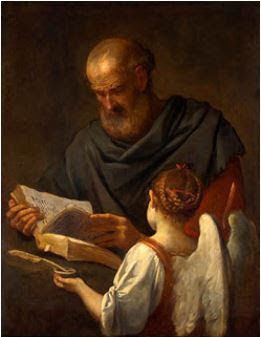Biographical Information about St. Matthew
 |
| "St. Matthew and the Angel" by Simone Cantarini, 1645-48 |
I, a prisoner for the Lord,
urge you to live in a manner worthy of the call you have received,
with all humility and gentleness, with patience,
bearing with one another through love,
striving to preserve the unity of the Spirit
through the bond of peace:
one Body and one Spirit,
as you were also called to the one hope of your call;
one Lord, one faith, one baptism;
one God and Father of all,
who is over all and through all and in all.
But grace was given to each of us
according to the measure of Christ's gift.
And he gave some as Apostles, others as prophets,
others as evangelists, others as pastors and teachers,
to equip the holy ones for the work of ministry,
for building up the Body of Christ,
until we all attain to the unity of faith
and knowledge of the Son of God, to mature manhood,
to the extent of the full stature of Christ.
-------------------------------------------
Commentary on Eph 4:1-7, 11-13
St. Paul enjoins the Church at Ephesus to holiness and unity as part of his instructions on what it means to live the Christian life. Through one baptism (“the call you have received”) we are united in Christ and through Christ to God the Father. While humility is not listed in the Greek lists as a virtue, the evangelist raises self-effacing service of others to this status (see also 1 Corinthians 13:4, Galatians 5:22, and Colossians 3:12).
He goes on speaking of the unity of different parts of the living body of Christ, the Church, saying that different gifts were given (similar lists are found at Romans 12:3-8 and 1 Corinthians 12:1-31). He begins the list of gifts with those of spiritual leadership: apostles, prophets, evangelists, pastors, and teachers. These have been called to service to others.
CCC: Eph 4-6 1454; Eph 4-5 1971; Eph 4:2 2219; Eph 4:3-5 866; Eph 4:3 814; Eph 4:4-6 172, 249, 2790; Eph 4:7 913; Eph 4:11-16 794; Eph 4:11-13 669; Eph 4:11 1575; Eph 4:13 674, 695, 2045
-------------------------------------------
Responsorial Psalm: Psalm 19:2-3, 4-5
The heavens declare the glory of God;
and the firmament proclaims his handiwork.
Day pours out the word to day;
and night to night imparts knowledge.
R. Their message goes out through all the earth.
Not a word nor a discourse
whose voice is not heard;
Through all the earth their voice resounds,
and to the ends of the world, their message.
R. Their message goes out through all the earth.
-------------------------------------------
Commentary on Ps 19:2-3, 4-5
Psalm 19 is a hymn of praise. In these opening strophes, the psalmist rejoices in God’s visible hand, revealed in all creation. It is the first of two themes expressed in the psalm (the other is in praise of the Law). While no word of God announces his presence, his glory is revealed in the creation of all things.
CCC: Ps 19:2-5 299; Ps 19:2 326
-------------------------------------------
Gospel: Matthew 9:9-13
he saw a man named Matthew sitting at the customs post.
He said to him, “Follow me.”
And he got up and followed him.
While he was at table in his house,
many tax collectors and sinners came
and sat with Jesus and his disciples.
The Pharisees saw this and said to his disciples,
“Why does your teacher eat with tax collectors and sinners?”
He heard this and said,
“Those who are well do not need a physician, but the sick do.
Go and learn the meaning of the words,
I desire mercy, not sacrifice.
I did not come to call the righteous but sinners.”
-------------------------------------------
Commentary on Mt 9:9-13
The journey of Jesus continues with the Lord’s encounter with Matthew (Levi in St. Mark’s Gospel), the tax collector. The Pharisees are scandalized because this renowned teacher (Jesus) has chosen to associate with “sinners,” who clearly violate some of the numerous laws about ritual purity (Matthew 5:46). Jesus’ response, “I desire mercy, not sacrifice,” makes it clear that interior faith is more highly prized than purely ritualistic rigor.
This passage is the call of St. Matthew into discipleship. His profession, as customs worker or tax collector, would have stimulated controversy among the scribes and Pharisees, and the presence of others of the same type at the meal described, would have caused ritual impurity. However, as with his disciples, Peter, Andrew, James, and John, Jesus calls Matthew as he was engaged in his profession. The question the Pharisees ask, because such contact would have caused ritual impurity, would have been construed as a critical remark. The Lord responded with a challenge, quoting Hosea 6:6, and punctuated his response with the observation that those who were critical of his associations did not understand the scriptures they professed to represent.
CCC: Mt 9:12 581; Mt 9:13 589, 2100
-------------------------------------------
Reflection:
[1] The picture is "St. Matthew and the Angel" by Simone Cantarini, 1645-48.
[2] S.S Commemoratio
[3] The readings are taken from the New American Bible, with the exception of the psalm and its response which were developed by the International Committee for English in Liturgy (ICEL). This republication is not authorized by USCCB and is for private use only.
No comments:
Post a Comment